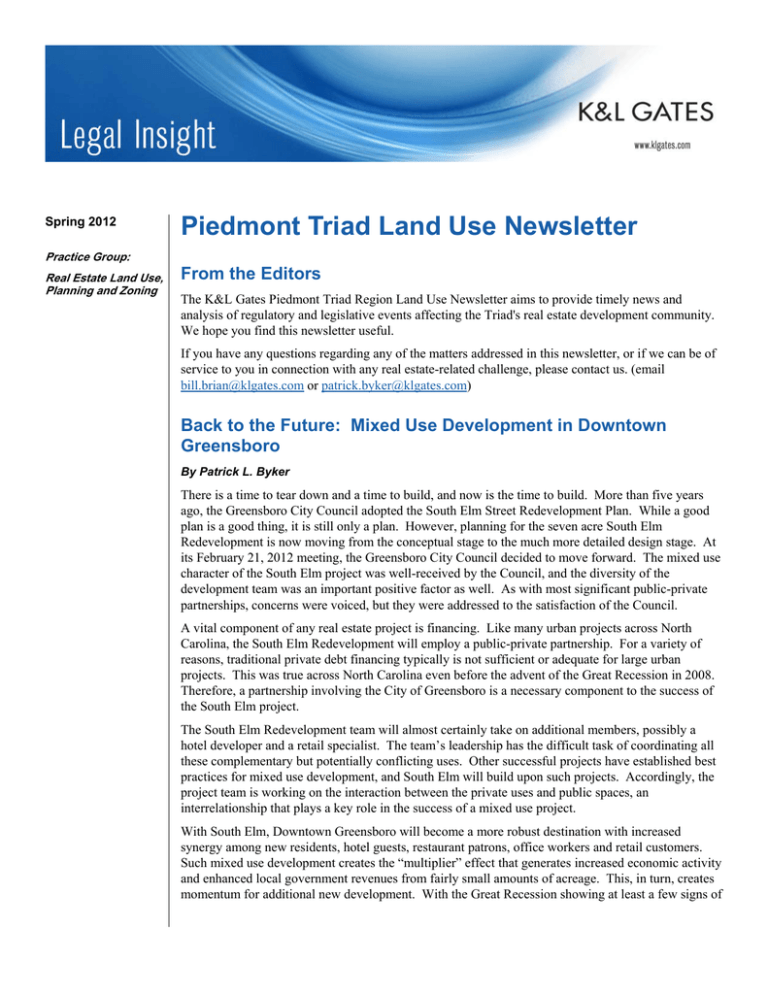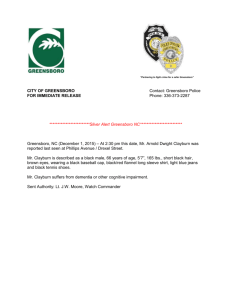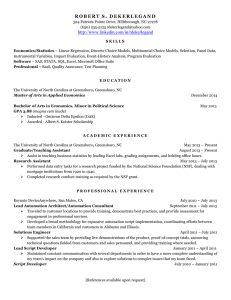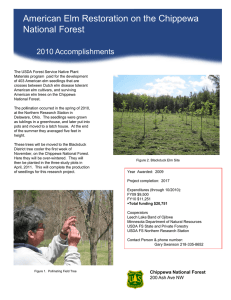Piedmont Triad Land Use Newsletter From the Editors
advertisement

Spring 2012 Piedmont Triad Land Use Newsletter Practice Group: Real Estate Land Use, Planning and Zoning From the Editors The K&L Gates Piedmont Triad Region Land Use Newsletter aims to provide timely news and analysis of regulatory and legislative events affecting the Triad's real estate development community. We hope you find this newsletter useful. If you have any questions regarding any of the matters addressed in this newsletter, or if we can be of service to you in connection with any real estate-related challenge, please contact us. (email bill.brian@klgates.com or patrick.byker@klgates.com) Back to the Future: Mixed Use Development in Downtown Greensboro By Patrick L. Byker There is a time to tear down and a time to build, and now is the time to build. More than five years ago, the Greensboro City Council adopted the South Elm Street Redevelopment Plan. While a good plan is a good thing, it is still only a plan. However, planning for the seven acre South Elm Redevelopment is now moving from the conceptual stage to the much more detailed design stage. At its February 21, 2012 meeting, the Greensboro City Council decided to move forward. The mixed use character of the South Elm project was well-received by the Council, and the diversity of the development team was an important positive factor as well. As with most significant public-private partnerships, concerns were voiced, but they were addressed to the satisfaction of the Council. A vital component of any real estate project is financing. Like many urban projects across North Carolina, the South Elm Redevelopment will employ a public-private partnership. For a variety of reasons, traditional private debt financing typically is not sufficient or adequate for large urban projects. This was true across North Carolina even before the advent of the Great Recession in 2008. Therefore, a partnership involving the City of Greensboro is a necessary component to the success of the South Elm project. The South Elm Redevelopment team will almost certainly take on additional members, possibly a hotel developer and a retail specialist. The team’s leadership has the difficult task of coordinating all these complementary but potentially conflicting uses. Other successful projects have established best practices for mixed use development, and South Elm will build upon such projects. Accordingly, the project team is working on the interaction between the private uses and public spaces, an interrelationship that plays a key role in the success of a mixed use project. With South Elm, Downtown Greensboro will become a more robust destination with increased synergy among new residents, hotel guests, restaurant patrons, office workers and retail customers. Such mixed use development creates the “multiplier” effect that generates increased economic activity and enhanced local government revenues from fairly small amounts of acreage. This, in turn, creates momentum for additional new development. With the Great Recession showing at least a few signs of Piedmont Triad Land Use Newsletter being in the rear view mirror, South Elm could be the driving force to take Downtown Greensboro up to a new level of vitality. An Interview with Bob Chapman and Robert L. Chapman, IV, the Father and Son Team Working on the South Elm Redevelopment Project By Patrick L. Byker Bob Chapman, President of Traditional Neighborhood Development Partners, and his son, Rob, provided their responses to four questions relating to the South Elm Redevelopment. 1. What makes South Elm a unique opportunity? Rob: “It’s the old real estate saying, ‘location, location, location.’ It is just an astonishing opportunity to have seven acres to develop right on one of the coolest streets in North Carolina. There just are not many places with great restaurants, pubs and theaters all within a five minute walk.” 2. Why is mixed use important for the South Elm project? Bob: “Mixed use really enlivens the street. Also, mixed use is what creates a positive public realm, sort of an outdoor living room. With buildings that are three stories high and wide sidewalks, you have ground floor retail and other activity that brings even more energy to the South Elm area.” 3. Is it important for South Elm to provide a lifestyle opportunity for persons who do not want to be auto-dependent? Rob: “As I just mentioned, you can walk to dozens of restaurants or entertainment venues, so somebody living here might not need to use their car for days. In fact, people might only use their car on the weekends for recreation. Plus, there is the Downtown Greenway, which gives folks a great way to get around by bicycle.” 4. What do you think will be the age diversity of South Elm residents? Bob: “We think there will be a lot of people in their twenties or early thirties, younger people who never have bought into suburbia. But there will be plenty of empty-nesters as well. To pick up on what Rob said about not needing a car, some older people are beginning to think they should not be driving as much, and so the age range of South Elm residents will be pretty wide. We have a great team and we’re looking forward to making this redevelopment happen.” Greensboro City Council Convenes Task Force to Evaluate Performing Arts Center By Lewis A. Cheek A Task Force was convened in January by the Community Foundation of Greater Greensboro, at the direction of the Greensboro City Council, to evaluate the merits and issues in connection with placement of a performing arts center in Downtown Greensboro. A broad cross-section of people from the business, arts, neighborhood, nonprofit and volunteer communities was assembled. Subcommittees have been appointed to study economic impact and feasibility, marketing and communications, private participation in funding and public opinion. The subcommittees have been meeting on a weekly basis to develop and assemble information for submission to the City Council. An important part of the work of the Task Force has been the effort to obtain community input. All meetings have been open to the public and to the media. Four community and four district forums 2 Piedmont Triad Land Use Newsletter have been conducted. There have been individual community leader interviews along with a survey of local arts organizations and artists. Lastly, a public survey of a cross-section of Greensboro citizens garnered 860 responses. The Task Force also visited other venues. On April 13, a large group of its members assembled at the Durham Performing Arts Center to view the premises and to hear from community leaders. On April 16, a smaller group flew to Dayton, Ohio to visit the Schuster Performing Arts Center. Both cities have realized significant economic benefit attributable to activity generated by their centers. A consultant, AMS Planning and Research Corporation, was employed to assist with the assessment of economic and community impact. On May 15, preliminary findings were reported to the City Council. To date, AMS has concluded that there is need for a new facility; that the Greensboro market should be able to support a new facility; that there is demand in the market for more programming; and that there are “vendors” of programming with interest in the Greensboro market. In addition, AMS opined that a new performing arts center would be a job generator and would result in millions of dollars for the Greensboro economy. Following the consultant’s report, the City Council voted 6-3 to authorize the Finance Director to file an application with the Local Government Commission for authorization to issue bonds. This is the first step in the process necessary to place a bond referendum on the November ballot. The Task Force is to make a recommendation to the City Council on whether to proceed with a downtown performing arts center on June 19. The Council is expected to take action on June 26. K&L Gates attorney Lewis Cheek is serving as a member of the Task Force. Contacts: William J. Brian, Jr. bill.brian@klgates.com +1.919.466.1261 Patrick L. Byker patrick.byker@klgates.com +1.919.466.1264 3



